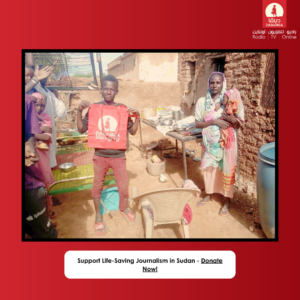Dutch journo reaps top award for Darfur reportage
Freelance journalist Klaas van Dijken has won the prestigious De Tegel (The Tile) 2015 award in the News Reporting category for a report on Darfur published in the Dutch newspaper Trouw last year.
Freelance journalist Klaas van Dijken has won the prestigious De Tegel (The Tile) 2015 award in the News Reporting category for a report on Darfur published in the Dutch newspaper Trouw last year.
One of the most important journalistic awards in the Netherlands – a country that prides itself on its free press – De Tegel is awarded to journalists who excel in several categories. Van Dijken received the award at a ceremony in the Royal Theatre in The Hague on 31 March.
In motivation of the award, the judging panel described the piece – one of 365 submitted – published in Trouw on 11 April 2015 as “A far-reaching and evocatively written report by a journalist who went the extra mile to allow us to see a forgotten drama.”
Civil war
Van Dijken was one of the first journalists to travel to Darfur in at least five years. The region has been plagued by civil war since 2003. Additionally, the national government in Khartoum have made the area strictly off-limits to foreigners; even relief organisations, let alone journalists. His report was illustrated with photographs by Adriane Ohanesian who travelled to Darfur with him.
The exclusive report documents the plight of the thousands of internally displaced people in Darfur, and exposes the harsh conditions suffered by those who have taken refuge from daily government attacks and aerial bombardments in the caves and valleys of Darfur’s mountainous Jebel Marra massif.
In an interview with Radio Dabanga, Van Dijken says that he and Ohanesian spent ten days in Jebel Marra in particular:
“I remember that one day, we climbed high up into the mountains. It was early in the morning, and we heard a noise from a distance. It was people whispering, a child was crying, and we entered a large smoky cave. I have never seen anything like that anywhere else in the world.
“There were hundreds of families living there – mostly women and children. We interviewed them and they said they were hiding because the government is bombing them. These are Sudanese civilians, so the Sudanese government is bombing its own people.
“We also encountered many women who claimed to have been raped by government soldiers. This was last year, but as I read in reports by Radio Dabanga, it is clear that this kind of thing is still ongoing.”
Tragedy
Asked why he thinks the international community does so little to stop this tragedy, Van Dijken says that in spite of investigations by the likes of Human Rights Watch, and indictments against Sudanese President Omar Al Bashir by the International Criminal Court (ICC), there is no political will in the world to really change things in Darfur and put pressure on the Sudanese government to stop the attacks on their own civilians.
“After we published our report last year, Human Rights Watch investigated what happened in Golo, and the ICC reopened the investigation into Al Bashir, but there is political self-interest from some countries so they have no will to stop what is happening in Sudan.
“I am a journalist, not an aid worker,” Van Dijken says,” so all I can do is share the story with the rest of the world, and I will continue to do this in the Dutch and international media. I am especially grateful to the people in Jebel Marra who were brave enough and willing to share their stories with me so that I can do that.
'Deal with the Devil'
“Moreover, if the international community has dealings with the regime in Khartoum, at least they should know they are making a deal with the Devil; a President wanted by the ICC for genocide is no small thing.”
Van Dijken stresses that while he saw the human suffering in Jebel Marra, he also saw its beauty: “The open hospitality of people who had nothing to give. That is something I will never forget.”
In conclusion, Van Dijken’s message to the international community is that justice has not been done in Sudan. He urges the international community to start to take action and pressurise the Sudanese government to stop the bombing of civilians, not only in Darfur, but also in the Two Areas of South Kordofan and Blue Nile.

Displaced civilians hiding in the caves in the western part of the Jebel Marra massif in February 2016 (Picture: Radio Dabanga)











 and then
and then